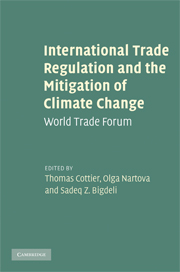Book contents
- Frontmatter
- Contents
- Contributors
- List of figures
- List of tables
- List of abbreviations
- Preface
- PART I Climate change mitigation: scientific, political and international and trade law perspectives
- PART II Climate change mitigation and trade in goods
- PART III Trade in renewable energy sources
- 8 Incentive schemes to promote renewables and the WTO law of subsidies
- 9 The WTO and climate change ‘incentives’
- 10 Certifying biofuels: benefits for the environment, development and trade?
- PART IV Climate change mitigation and trade in services
- PART V Climate change and technology transfer, investment and government procurement: legal issues
- PART VI Institutional challenges and the way forward
- Index
8 - Incentive schemes to promote renewables and the WTO law of subsidies
from PART III - Trade in renewable energy sources
Published online by Cambridge University Press: 04 August 2010
- Frontmatter
- Contents
- Contributors
- List of figures
- List of tables
- List of abbreviations
- Preface
- PART I Climate change mitigation: scientific, political and international and trade law perspectives
- PART II Climate change mitigation and trade in goods
- PART III Trade in renewable energy sources
- 8 Incentive schemes to promote renewables and the WTO law of subsidies
- 9 The WTO and climate change ‘incentives’
- 10 Certifying biofuels: benefits for the environment, development and trade?
- PART IV Climate change mitigation and trade in services
- PART V Climate change and technology transfer, investment and government procurement: legal issues
- PART VI Institutional challenges and the way forward
- Index
Summary
Introduction
Presidents Ford and Carter's warnings in the 1970s on US dependence on foreign oil and Gore's warnings today on climate change have the same policy implication — move towards a low carbon economy. This is because carbon dioxide is the most important anthropogenic greenhouse gas (GHG) and its increasing concentration in the atmosphere since the pre-industrial period is primarily due to fossil fuel use. In this respect, the international climate protection regime reflected in the UN Framework Convention on Climate Change and especially its Kyoto Protocol points in two directions — discourage fossil fuel subsidies and promote energy efficiency and renewable energy (RE) sources (Inferred from Kyoto Article 2.1.a (iv) and (v)).
From a pure theoretical economic viewpoint, subsidisation might not be the best way to promote renewables. Most economists would prefer to apply a proper taxation system which takes into account all environmental externalities related to fossil fuels. On a global level, an economically plausible cap and trade system may also be a way to achieve this. The lack of political consensus behind these ‘market-based instruments’, however, has led policy-makers to devise various domestic incentive schemes to promote renewables. Such schemes include subsidies among other regulatory schemes such as feed-in tariffs. Their primary aim is to level the playing field between conventional and renewable energy sources, currently obstructed by the relatively high costs of RE technologies and also to some extent by subsidies on fossil fuels.
- Type
- Chapter
- Information
- International Trade Regulation and the Mitigation of Climate ChangeWorld Trade Forum, pp. 155 - 192Publisher: Cambridge University PressPrint publication year: 2009
- 7
- Cited by



